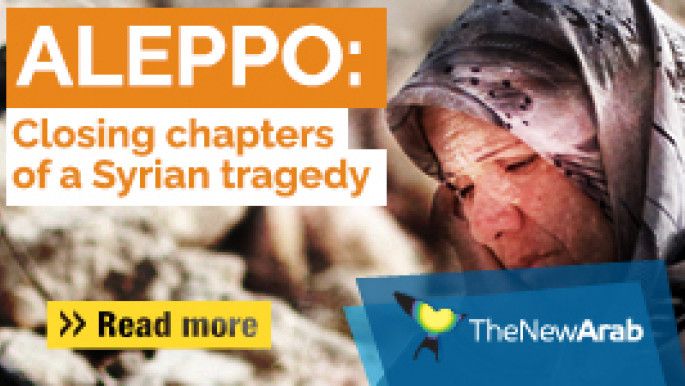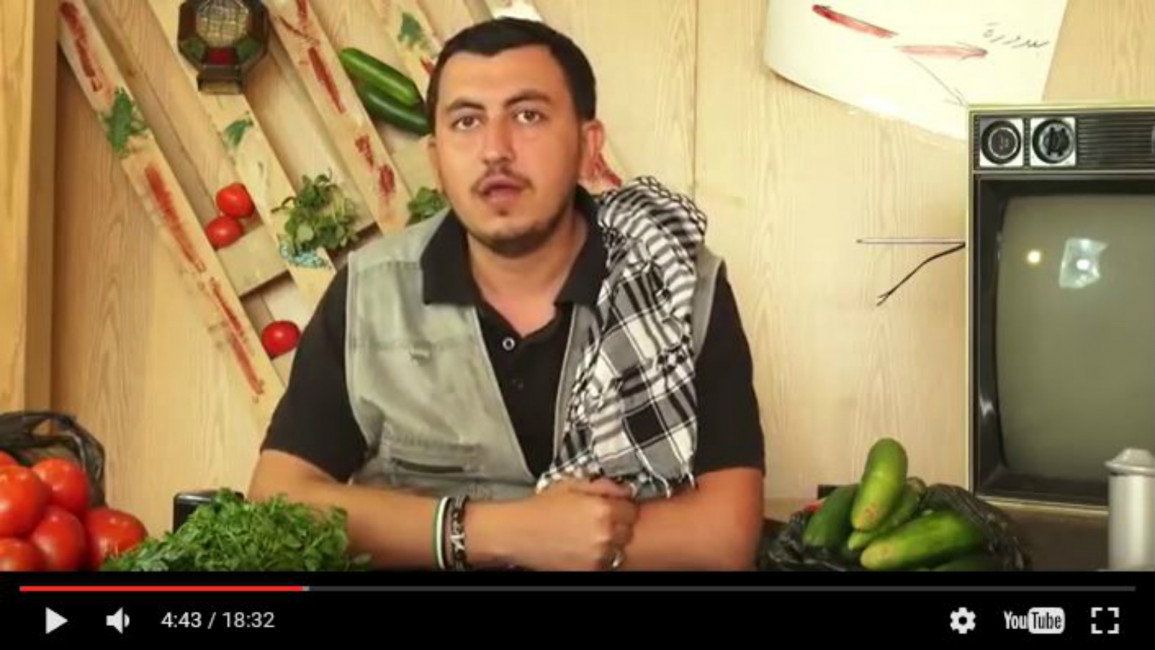
Aleppo's forgotten revolutionaries
In journalism and on social media, I often come across a narrative - from the Syrian regime's most ardent supporters, to even those who acknowledge its oppressive nature - asserting that the Assad regime is fighting a war against vile, extremist, Al-Qaeda-like organisations.
The ignorant simplicity of this argument became clear after the fall of rebel-held eastern Aleppo.
The city was often portrayed as the epicentre of a jihadi insurgency liberated by the national army. Many ostensibly left-wing individuals worldwide even went so far as to celebrate this as "liberation".
This narrative is especially frustrating as it completely ignores the history of revolutionary Aleppo. On most blogs and Twitter timelines, the revolutionary icons of government-held western Aleppo are never mentioned.
There were many activists against the government, later detained and kidnapped by extremist groups, who are left out of the conversation.
When so-called experts write about eastern Aleppo, they may feel compelled to begin the conversation as though the war had started in 2016, when the supposedly "good", "secular" government liberated Aleppo from extremists.
The story of east Aleppo and the revolutionary icons who struggled there between 2012 and 2014 is almost completely ignored.
Indeed, there are countless icons of the Syrian revolution who have been ignored and erased from history in the western media.
 |
On most blogs and Twitter timelines, the revolutionary icons of government-held western Aleppo are never mentioned |  |
Unlike the acts of extremists Islamic State (IS), and Jabhat Nusra, the actual words and deeds of Syria's forgotten revolutionaries have rarely been translated and broadcast by the western media. Abo Mariam and Abdul Wahab Mulla are two Syrians who even educated readers have probably never heard of.
Abo Mariam was the main voice of eastern Aleppo, alongside his little brother, Aboud. He was known for his critical slogans against both extremists and the Assad regime. Hundreds of people used to gather around him in demonstrations, echoing his chants against the government and extremism, and his calls for justice for all.
 |
|
Foreign journalists who visited Aleppo during the summer of 2012 will agree that these demonstrations were the soul of Bustan Al-Kasr and eastern Aleppo.
Later in 2013, during one of the protests, Abo Mariam was filmed taking down a banner that read "The people want an Islamic state" amid chants of support from his fellow protestors. Abo Mariam disappeared shortly thereafter, prompting days of protests outside of Jabhat Al-Nusra headquarters, demanding his release. There has been no news of his whereabouts to this day.
Secondly, Abdul Wahab Al Mulla had a YouTube show, which fortunately is still accessible online. Abdul Wahab's show titled, "Three Stars Revolution," was a channel through which he would criticise the violations of various rebel groups and remind people of the original aims of the Syrian uprising. His show had thousands of viewers, and he was considered a true icon.
In November 2013, armed masked men broke into Abdul Wahab Al Mulla's house and took him away.
 |
By contrast, they will be completely ignored by almost anyone watching Aleppo through the lens of mainstream coverage |  |
For Syrians, these are the revolutionary icons of eastern Aleppo. They will always be remembered as heroes who represented what the Syrian uprising stood for. By contrast, they will be completely ignored by almost anyone watching Aleppo through the lens of mainstream coverage.
It is true that JFS played vital role in breaking the last siege of eastern Aleppo, but can you really blame the civilians who celebrated the breaking of the siege? Can we blame the father who welcomes the devil just to not see his children starve to death, when it is the government that is imposing siege on its own people?
It is also rather unjust to mention Al-Qaeda and other extremist groups without mentioning those who stood against them.
Sadly the western press will ignore the sacrifice made by activists like Abdul Wahab and Abo Mariam, while continuing to give a voice to Jabhat Al Nusra, now known as Jabhat Fateh Al Sham (JFS), who not only harassed many secular activists and pushed them out, but hijacked the uprising by taking advantage of the starvation and suffering imposed by Assad government.
What about the rebels?
When referring to Aleppo, the Free Syrian Army is often put in the same category as that of Al Qaeda without mentioning that they were the first force that fought Al Qaeda and IS back in 2013 in eastern Aleppo. Most of today's so-called experts are blind to this fundamental historical point.
 |
For us, freedom and dignity means opposing all tyrannies, opposing all the forces who threatened Abo Mariam and his peaceful chants |  |
In late 2013, over 30 activists and rebels were killed in IS jails in Aleppo. A whole group of medics, documented by name, were excuted by Islamic State fighters before Syrian rebels seized their military bases. Human rights organisations covered this, but only a fraction of mainstream media outlets paid any notice.
The rebels later continued to Idlib, forcing IS to withdraw to Raqqa, Bab and Manbij. IS also lost their territory in Aleppo and the outskirts of Lattakia; causing Raqqa to become the 'capital' of their caliphate. It's very important to remember that the first battle against IS took place in eastern Aleppo, and that the first victory against IS by the rebels took place there.
However, for some reason, the mainstream media gives a disproportionate amount of coverage to the PKK-affiliated YPG and Kobane when describing early battles against IS.
The Free Syrian Army and the activists who were detained and killed are, once again, out of the equation.
There is a great distance between those of us who witnessed the revolution, and those who refuse to acknowledge that our revolution was a true uprising, where many people sacrificed their lives fighting against extremists and the government.
For us, freedom and dignity means opposing all tyrannies, opposing all the forces who threatened Abo Mariam and his peaceful chants. Once again, these voices are simply brushed aside, and our icons are not mentioned by any of the so-called experts who are preoccupied with telling their readers about an amorphous conspiracy against Assad.
 |
These people who lived in Aleppo's revolution truly are heroes - standing up against both extremists and the Assad government |  |
If only those who spend hours trolling Bana Al-Abed on Twitter would speak to activists and civilians from eastern Aleppo and give them a platform to speak about what went wrong, we would know that these people who lived in Aleppo's revolution truly are heroes - standing up against both extremists and the Assad government.
These activists routinely condemned every rebel-attack on government-held areas resulting in the deaths of innocent civilians and demanded accountability for all war crimes.
Not only do the Assad regime, JFS and their extremist allies censor these voices, but they are omitted by those who, to this day, still do not believe that Syria had a true, organic uprising.
The narrative claiming that these icons are CIA agents, extremists or simply non-existent, is quite convenient for people who aren't interested in learning the history of our uprising or confronting the amount of innocent blood spilled in crushing it.
And for foreign journalists who spent time with these activists, fixers, and citizen journalists: Writing about those people in western Aleppo is the least they can do.
Loubna Mrie is a Syrian activist who participated in the initial stages of the revolution. She later became a photojournalist with Reuters where she covered the ongoing conflict.
She is currently based in New York City where she is a researcher and commentator on Syrian and Middle Eastern affairs and is completing an MA at NYU. Her work has been published in major outlets including the Washington Post, Foreign Affairs, Foreign Policy, and New Republic.
Follow her on Twitter: @loubnamrie
Opinions expressed in this article remain those of the author and do not necessarily represent those of The New Arab, its editorial board or staff.



